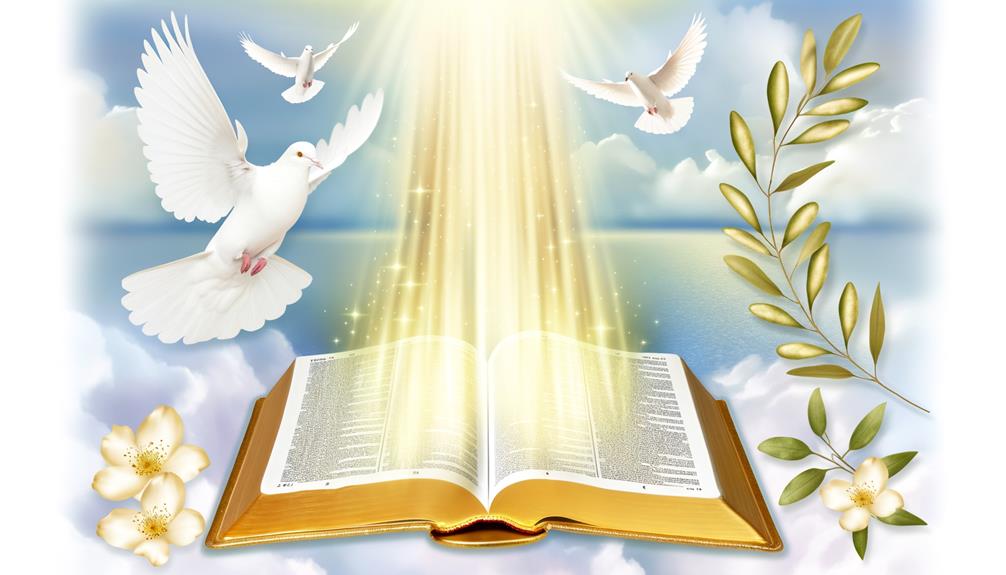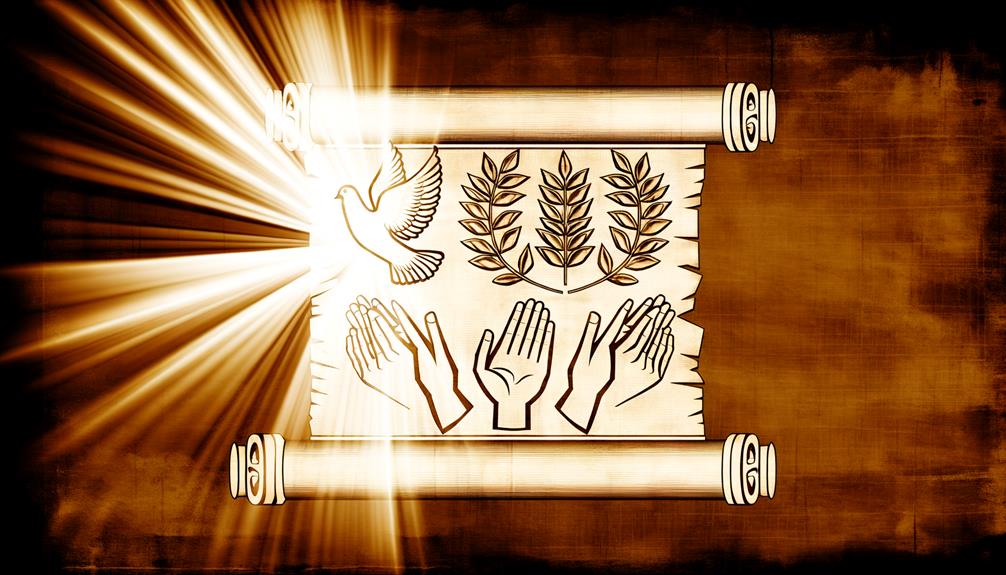Bible Book of Phrases Meaning Praises: Worship and Adoration
The Bible is rich with phrases expressing praise and adoration, from the lyrical poetry in Psalms that glorify God’s majesty to the hymns in the Gospels highlighting significant moments in Jesus’ life. The book of Isaiah abounds with passages extolling divine grandeur and sovereignty.
Revelation offers vivid depictions of heavenly worship, while Paul’s letters emphasize gratitude as fundamental to Christian life. Proverbs and the Beatitudes underscore values such as humility and integrity, central to honor and spiritual blessings.
Each book, through its unique expressions of praise, provides profound insights into the divine-human relationship and worship practices. Exploring these texts reveals deeper spiritual and theological dimensions.

The Meaning of Praises in the Book of Psalms: A Biblical Expression of Worship, Gratitude, and Trust in God
| Aspect | Biblical Meaning | Scriptural Significance |
|---|---|---|
| Worship and Adoration | The Psalms are filled with praises that express worship and adoration of God’s greatness, majesty, and holiness. Praising God is an acknowledgment of His supremacy. | Reflects passages like Psalm 145:3, “Great is the Lord, and most worthy of praise,” emphasizing God’s majesty and worthiness of worship. |
| Gratitude and Thanksgiving | Many Psalms express gratitude to God for His provision, protection, and blessings, encouraging believers to thank God for His faithfulness. | In Psalm 100:4, “Enter His gates with thanksgiving and His courts with praise,” praising God is an act of giving thanks for His goodness. |
| Trust in God’s Faithfulness | Praises in the Psalms often reflect deep trust in God’s faithfulness, even in times of trouble or distress, affirming that God is always present and dependable. | Psalm 34:1 says, “I will bless the Lord at all times; His praise shall continually be in my mouth,” reflecting trust in God’s unwavering support. |
| Expressions of Joy | Praising God in the Psalms is often linked to joy and celebration, expressing delight in God’s presence and the blessings He provides. | Psalm 150:6 says, “Let everything that has breath praise the Lord,” highlighting joyful praise as a response to God’s abundant goodness. |
| Appeals for Help | Some Psalms of praise include appeals for God’s help or deliverance, showing that even in times of need, the psalmist praises God, trusting in His saving power. | Psalm 22 begins with a cry for help but transitions into praise, demonstrating faith in God’s deliverance despite present difficulties. |
| Repentance and Restoration | Certain Psalms include praises that follow repentance, where the psalmist acknowledges sin but praises God for His mercy and willingness to forgive. | Psalm 51 is a psalm of repentance, where David, after seeking forgiveness, praises God’s mercy and loving-kindness. |
| Meditation on God’s Attributes | The Psalms praise God by meditating on His attributes, such as His love, justice, wisdom, and power, offering a reflection on His character. | Psalm 103:8 praises God’s character: “The Lord is compassionate and gracious, slow to anger, abounding in love.” |
| Encouragement to Praise | Many Psalms encourage not only the individual but also the community to join in praising God, uniting believers in collective worship and adoration. | Psalm 95:1-2 calls for collective praise: “Come, let us sing for joy to the Lord; let us shout aloud to the Rock of our salvation.” |
Praises in the Psalms

The Psalms, a profound anthology of lyrical poetry within the Bible, are replete with expressions of praise that reflect a deep reverence and adoration for the divine.
These hymns and prayers articulate the multifaceted nature of human devotion, ranging from exultant thanksgiving to fervent supplication.
The Psalms employ vivid imagery and metaphorical language to convey the majesty and omnipotence of God. For instance, Psalm 19 extols the glory of God through the wonders of creation, while Psalm 23 portrays the Lord as a shepherd providing guidance and sustenance.
This collection, attributed to various authors including King David, serves not only as a liturgical resource but also as a theological and poetic exploration of divine-human relationships.
Hymns From the Gospels

Building upon the rich tradition of praise found in the Psalms, the Gospels present a series of hymns that encapsulate pivotal moments in the life of Jesus Christ, offering theological insights and deepening the narrative’s spiritual resonance.
Among these, the Magnificat (Luke 1:46-55) and the Nunc Dimittis (Luke 2:29-32) stand out for their profound theological and liturgical significance. The Magnificat, Mary’s song of praise, highlights themes of divine mercy and social reversal.
In contrast, the Nunc Dimittis, Simeon’s hymn of departure, underscores the fulfillment of God’s promises through the arrival of the Messiah.
These hymns not only enhance the narrative but also serve as enduring expressions of faith, embodying the Gospel’s core message of salvation and divine intervention.
Adoration in Isaiah

The Book of Isaiah is replete with passages that extol the grandeur of the Divine, capturing the essence of prophetic praise through vivid and poetic language.
Central to these passages is the depiction of divine majesty, where the attributes of God are exalted to inspire reverence and adoration.
This subtopic will examine how Isaiah’s articulation of God’s supreme authority and glory functions both as a theological assertion and a literary masterpiece.
Prophetic Praise Passages
Isaiah’s prophetic praise passages intricately weave themes of divine adoration with profound theological insights, establishing a cornerstone for understanding the nature of worship in the Old Scriptures.
These passages not only exalt the sovereignty and holiness of God but also emphasize His redemptive work and covenantal faithfulness. Isaiah’s language is rich and evocative, drawing readers into a deeper appreciation of God’s majesty and compassion.
Key elements include:
- Exaltation of God’s Sovereignty: Isaiah consistently acknowledges God’s supreme authority over all creation.
- Redemptive Promises: Prophetic proclamations often highlight God’s plan for salvation and restoration.
These elements collectively enrich the theological tapestry of Isaiah’s praise.
Divine Majesty Described
Central to Isaiah’s prophetic praise is a vivid portrayal of divine majesty, where God’s unparalleled greatness and splendor are meticulously articulated.
Isaiah’s text employs rich, evocative imagery to convey an awe-inspiring vision of the Lord, seated on a high and exalted throne, attended by seraphim who declare His holiness (Isaiah 6:1-4). This scene underscores God’s sovereign authority and transcendent purity, inviting readers into a profound sense of reverence.
Additionally, Isaiah’s descriptions emphasize God’s power over creation and nations, portraying Him as the ultimate arbiter of justice and mercy.
The prophet’s language is both poetic and authoritative, aiming to elevate the reader’s understanding of God’s exalted nature and to inspire heartfelt adoration and worship.
Worship in Revelation

In the Book of Revelation, the depiction of worship is a multifaceted tableau that includes vivid scenes of heavenly worship, intricate descriptions of angelic praises, and rich symbolism that underscores the sacredness of divine reverence.
The text offers a compelling portrayal of celestial beings continuously exalting God, which not only enhances the narrative’s theological depth but also provides insights into early Christian eschatological expectations.
Heavenly Worship Scenes
How does the Book of Revelation depict the grandeur and significance of heavenly worship scenes, and what theological implications do these portrayals carry for understanding divine sovereignty and eschatological hope?
Revelation’s vivid descriptions of heavenly worship illustrate the majesty and authority of God, emphasizing His ultimate control over cosmic events. These scenes serve as a profound reminder of divine omnipotence and the ultimate triumph of good over evil, reinforcing believers’ hope in the fulfillment of God’s promises.
The imagery of elders and living creatures continuously praising God underscores perpetual divine worship.
The Lamb who was slain being worshiped highlights the centrality of Christ‘s redemptive work.
The multitude from every nation illustrates the inclusivity and universal scope of salvation.
Such portrayals deepen theological insights into worship and eschatology.
Angelic Praises Described
The Book of Revelation vividly portrays angelic praises as integral components of heavenly worship, revealing intricate layers of theological significance. The celestial liturgy, as described in Revelation, encompasses continuous adulation by angelic beings, encapsulating the essence of divine reverence. Key passages highlight the angels’ role in exalting God’s holiness and sovereignty, forming a liturgical framework that underscores the eschatological hope.
| Verse | Description | Theological Significance |
|---|---|---|
| Revelation 4:8 | ‘Holy, holy, holy…’ | Affirmation of God’s absolute purity |
| Revelation 5:12 | ‘Worthy is the Lamb…’ | Christ’s redemptive victory |
| Revelation 7:11-12 | ‘Amen! Blessing and glory…’ | All-encompassing worship formula |
| Revelation 19:1-2 | ‘Hallelujah! Salvation…’ | Celebration of divine justice |
These praises not only reflect devotion but also convey profound doctrinal truths.
Worship Symbolism Explained
Symbolism in the Book of Revelation serves as a profound conduit for understanding the multifaceted dimensions of worship within the apocalyptic narrative. This sacred text employs rich imagery to convey the essence of divine reverence and adoration.
Key symbols include:
- The Lamb: Representing Christ, the Lamb signifies ultimate sacrifice and victory, central to Christian worship.
- The Throne: Symbolizing God’s sovereignty and majesty, the throne underscores the reverence and awe attributed to divine authority.
Such symbolism elucidates the depth and breadth of worship practices, illustrating their intrinsic connection to theological principles and eschatological themes. The act of worship goes beyond mere ritualistic observances, encompassing a profound understanding of the purpose and significance of spiritual communion. In essence, the meaning of worship extends far beyond the physical realm, functioning as a gateway to spiritual enlightenment and a means of expressing one’s devotion to a higher power. Through its intricate symbolism and rich tradition, the practice of worship serves as a conduit for believers to explore and internalize the profound meaning of worship in their daily lives.
Understanding these symbols enriches the comprehension of Revelation’s worship paradigms.
Gratitude in Paul’s Letters

In examining Paul’s epistles, one can discern a consistent and profound emphasis on gratitude, which serves as a foundational element of his theological and ethical teachings.
Paul frequently exhorts believers to give thanks in all circumstances, recognizing gratitude as a response to God’s grace and benevolence. For instance, in Philippians 4:6, he advises, ‘Do not be anxious about anything, but in every situation, by prayer and petition, with thanksgiving, present your requests to God.’ This directive underscores the integral role of gratitude in fostering a Christ-centered life.
Additionally, Paul’s letters often open with expressions of thanks for the faith and perseverance of the early Christian communities, further highlighting his belief in the transformative power of a grateful heart.
Exaltation in the Proverbs

Among the various themes woven throughout the Book of Proverbs, exaltation emerges as a significant motif, often linked to wisdom and righteousness. Proverbs underscores the principle that those who live righteously and seek wisdom are exalted by God and society. This exaltation is manifested in several ways:
Moral Integrity: Proverbs 14:34 states, ‘Righteousness exalts a nation,’ highlighting how moral conduct elevates communities.
Wisdom Over Wealth: Proverbs 4:7 emphasizes, ‘Wisdom is the principal thing,’ suggesting that wisdom is more valuable and exalting than material riches.
Humility Precedes Honor: Proverbs 15:33 teaches, ‘Before honor is humility,’ indicating that true exaltation follows a path of humility.
These elements collectively underscore the Proverbs’ intricate relationship between exaltation and virtuous living.
Thanksgiving in the Torah

The theme of thanksgiving in the Torah is intrinsically linked to the acknowledgment of divine providence and the cultivation of a grateful spirit among the Israelites. This theme is pervasive, reflecting a deep-seated recognition of Yahweh’s role in their liberation, sustenance, and guidance. Rituals and offerings, such as the Todah (thanksgiving offering), serve as tangible expressions of gratitude.
| Torah Passage | Significance |
|---|---|
| Leviticus 7:12 | Details the thanksgiving offering procedure. |
| Deuteronomy 8:10 | Encourages gratitude after meals. |
| Exodus 15:1-21 | The Israelites’ song of thanks post-Red Sea. |
These passages illustrate how thanksgiving is woven into the fabric of daily life, reinforcing the community’s reliance on and devotion to their deity.
Blessings in the Beatitudes

Integral to the Sermon on the Mount, the Beatitudes are a series of blessings that encapsulate key ethical teachings and spiritual principles central to Christian doctrine. These blessings, pronounced by Jesus, emphasize humility, compassion, and righteousness, offering profound insights into the values esteemed by Christian ethics.
The Beatitudes highlight:
- Spiritual Poverty: Blessed are the poor in spirit, for theirs is the kingdom of heaven, emphasizing humility and dependence on God.
- Mourning: Blessed are those who mourn, for they shall be comforted, recognizing the value of empathy and the promise of divine consolation.
These teachings provide a moral framework that inspires Christians towards virtuous living.
Honor in the Book of Job

Examining the narrative of the Book of Job reveals profound insights into the concept of honor, particularly through Job’s unwavering integrity amidst immense suffering and adversity.
Job’s steadfastness is a reflection of his deep-rooted honor, which remains intact despite the successive loss of wealth, health, and family. His refusal to curse God, even when urged by his wife and friends, underscores a profound commitment to righteousness.
This narrative illustrates that honor is not merely a social construct but a deeply personal and spiritual attribute. Job’s dialogues with his friends and ultimately with God highlight the intrinsic value of maintaining honor, suggesting that true honor withstands trials, is self-sustaining, and aligns with divine principles of faith and morality.
Conclusion
The Bible, like a grand symphony, orchestrates a diverse array of praises across its many books, each contributing a unique melody to the overarching theme of reverence.
From the Psalms’ heartfelt songs to the Gospels’ hymns, Isaiah’s adoration, Revelation’s worship, and Paul’s gratitude, to the Proverbs’ exaltation, the Torah’s thanksgiving, the Beatitudes’ blessings, and Job’s honor, each text harmonizes to create a rich tapestry of worship and veneration.
This intricate interplay underscores the multifaceted nature of biblical praise.






